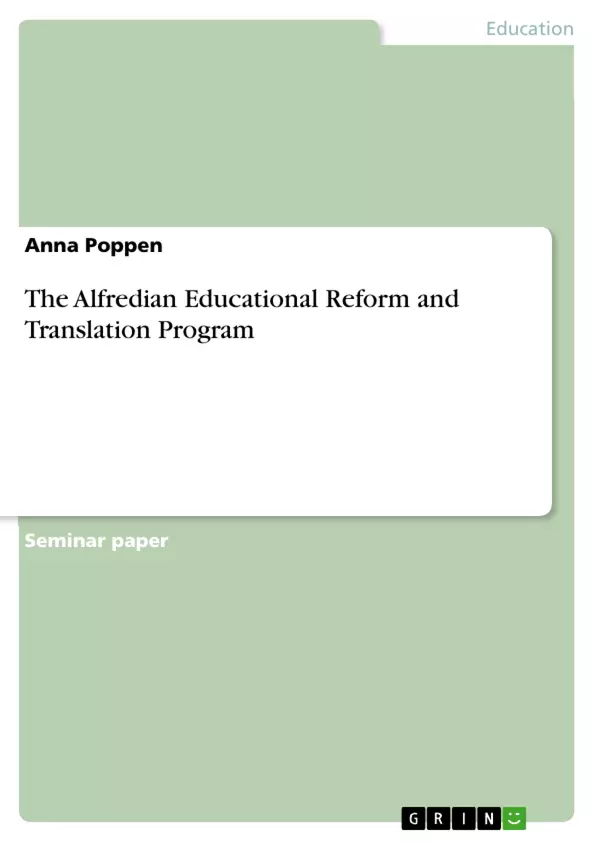King Alfred, who ruled the kingdom of Wessex from 871 to 899, is the only English King, who came to be known as the Great. Today he is remembered and glorified as a great Christian king, who defeated the Vikings, who kept invading and plundering England in the second half of the 9th century. But apart from great military and political achievements, Alfred also stands for educational reform and he is credited for having encouraged the advancement of the Old English language in what was to become the Anglo-Saxon kingdom.
What scholars know about Alfred and his actions today is mostly derived from four different sources. Most important is a biography of King Alfred called The Life of King Alfred. This text was written in 893 by Asser, a contemporary of the king. In this biography Asser states that he used to be a monk at St David’s, a monastery in Dyfed in Wales, until King Alfred asked him to serve as one of his scholars and advisors. The biography deals with King Alfred’s life starting with his birth, but ending abruptly, leaving out the king’s actions in the 890s and his death. When dealing with Asser’s biography of King Alfred, it is important to keep in mind that the text is not an objective and accurate work, but rather a “celebration of Alfred’s greatness for the edification of multiple audiences” .
The second source is the Anglo-Saxon Chronicle, which was written by one or more anonymous authors. This text deals with the political and military developments during Alfred’s reign and it contains some information about the king himself. The origin of the Anglo-Saxon Chronicle and its role within the Alfredian translation program will be dealt with later in this work.
The third source is the texts from King Alfred’s translation program, which were a very important part of his educational reforms. The translation program is a topic that has caused many debates among scholars as will be seen in the course of this work. However, the different writings of King Alfred and the scholars at his court provide a lot of useful information on the king’s thoughts and plans.
Lastly, coins and archaeology provide important information about King Alfred the Great and his times as well.
Since there are quite a lot of contradictory sources providing information on the life of King Alfred the Great, scholars have created quite different and controversial pictures of one and the same historical figure.
Inhaltsverzeichnis (Table of Contents)
- Introduction
- The Life of King Alfred the Great
- Biographical Information
- King Alfred's Educational Background
- King Alfred's Educational Reform
- The Pursuit of Wisdom
- King Alfred's Scholars
- King Alfred's Translation Program
- King Alfred's Writing
- Works by King Alfred's Scholarly Team
- Works Produced During King Alfred's Reign
- Conclusion
Zielsetzung und Themenschwerpunkte (Objectives and Key Themes)
This work aims to explore the life and achievements of King Alfred the Great, specifically focusing on his educational reforms and translation program. It aims to provide a detailed overview of his life, including his biographical information, his educational background, and the impact of his educational reforms on the development of the English language and Anglo-Saxon culture.
- King Alfred's life and reign in the historical context of Anglo-Saxon England
- King Alfred's educational background and the debate surrounding his literacy
- The impact of King Alfred's educational reforms on the advancement of the Old English language
- The role of King Alfred's translation program in promoting knowledge and literacy
- The historical significance of King Alfred's achievements in education and culture
Zusammenfassung der Kapitel (Chapter Summaries)
The introductory chapter provides an overview of the key sources used to understand King Alfred's life and reign. It discusses the importance of Asser's biography of Alfred, the Anglo-Saxon Chronicle, Alfred's translation program, and archaeological evidence in understanding his life and impact.
The second chapter delves into Alfred's life, focusing on his early life, his ascension to the throne, and his struggles against the Vikings. The chapter examines the Treaty of Wedmore, which brought a period of peace to Wessex and allowed Alfred to focus on his reforms. It also explores the debate surrounding the reliability of Asser's biography and the role of other sources in understanding Alfred's life.
Chapter three discusses Alfred's educational background, focusing on the debate surrounding his literacy and the process of his education. It analyzes Asser's claims about Alfred's early education and his eventual mastery of reading and translating Latin. It explores the perspectives of different scholars, including Keynes, Lapidge, Abels, and Smyth, on Alfred's educational journey.
Schlüsselwörter (Keywords)
Key terms and concepts explored in this work include King Alfred the Great, Anglo-Saxon England, educational reforms, translation program, Old English language, Asser's Life of King Alfred, Anglo-Saxon Chronicle, Treaty of Wedmore, Viking invasions, literacy, Latin, vernacular, and historical sources.
Frequently Asked Questions
Why is King Alfred known as "the Great"?
He is honored for his military success against Viking invasions and his significant contributions to educational reform and the promotion of the English language.
What was the primary goal of Alfred's educational reform?
The goal was to restore learning and wisdom in his kingdom by promoting literacy in both Latin and the Old English vernacular among the clergy and nobility.
What are the main sources for information on King Alfred?
The most important sources are Asser's biography "The Life of King Alfred," the Anglo-Saxon Chronicle, and the texts produced during his translation program.
What was the Alfredian Translation Program?
It was a program to translate key Latin texts, which Alfred considered essential for all men to know, into Old English to make knowledge more accessible.
Was King Alfred himself literate?
Scholars debate this, but historical records suggest he learned to read and translate Latin later in life with the help of his court scholars.
- Arbeit zitieren
- Anna Poppen (Autor:in), 2008, The Alfredian Educational Reform and Translation Program, München, GRIN Verlag, https://www.grin.com/document/230242



